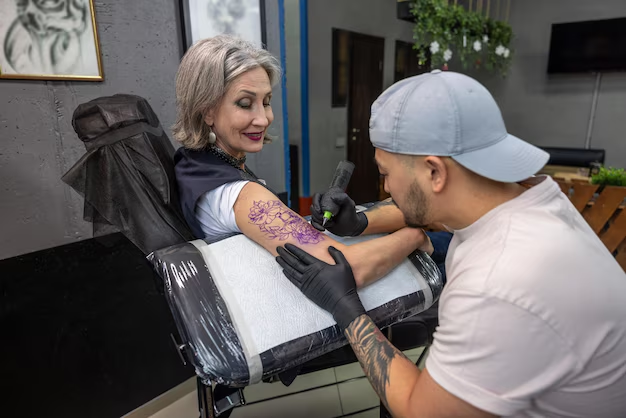Could Tattoos Pose a Risk of Cancer? Here's What You Need to Know
Tattoos have become a ubiquitous part of modern culture. With their increasing popularity, many people wonder whether tattoos could pose any health risks, including the possibility of causing cancer. While tattoos are generally considered safe when done by professional artists under sanitary conditions, questions about their long-term impact on health remain important. Let’s delve into the intricacies of tattoos and their potential link to cancer, empowering you with information to make informed decisions about body art.
Understanding Tattoos: Beyond the Ink
What Happens During Tattooing?
When you get a tattoo, ink is embedded into the dermis, the second layer of skin, using needles. This process creates a permanent mark, as the ink particles are too large to be consumed by white blood cells and are thus trapped in the dermis.
What Are Tattoo Inks Made Of?
Tattoo inks are composed of pigments suspended in a carrier solution. These pigments can be derived from a variety of sources:
- Inorganic pigments: Such as titanium dioxide, used for white inks and as a base in other colors.
- Organic pigments: Often used for black and other vibrant colors.
- Metallic salts: Like chromium and cadmium, which provide specific shades.
The carrier solution aids in the application and smooth flow of the ink. This solution usually contains ethanol, glycerin, or distilled water.
Can Tattoos Increase Cancer Risk?
The Debate on Tattoo Ink Ingredients
A major focus of the cancer risk discussion revolves around tattoo ink ingredients. Certain pigments may contain potentially harmful substances, such as:
- Carcinogenic compounds: Aromatic amines are sometimes present in dyes used for color tattoos.
- Heavy metals: Such as lead, arsenic, and cadmium, potentially toxic in high amounts and associated with various health risks.
The Immune System’s Response
Once the ink is deposited into the skin, the immune system responds by sending cells to heal the area. Some ink particles remain within the dermis while others migrate to lymph nodes. There’s an ongoing inquiry into how these particles affect cells over time, and whether they contribute to mutations that could trigger cancer.
Current Evidence and Research
To date, there is no conclusive scientific evidence directly linking tattoos to cancer. Most studies have not shown a significant increase in cancer cases among tattooed individuals. However, ongoing research is essential as more people get tattoos and new inks are developed.
Other Health Considerations Related to Tattoos
Skin Infections
Inadequate hygiene during the tattooing process can result in bacterial infections. It’s crucial to follow proper aftercare instructions and ensure that the tattoo studio adheres to health regulations.
Allergic Reactions
Some individuals may experience allergies to certain pigments or inks, leading to redness, itching, and swelling. This is particularly common with red, yellow, and blue inks.
MRI Complications
People with tattoos sometimes report discomfort during magnetic resonance imaging (MRI) due to metallic components in the ink. While rare, this can result in skin irritation or burns.
Best Practices for Safer Tattooing
How to Choose a Tattoo Studio
- Research and reviews: Read testimonials and check ratings online.
- Hygiene standards: Ensure the studio follows strict sanitation protocols.
- Licensing and certification: Confirm that the tattoo artist is licensed and the shop complies with local health regulations.
What to Discuss with Your Tattoo Artist
- Ink ingredients: Ask about the pigments and carriers used in inks.
- Allergy tests: Consider patch testing for sensitivities to certain colors.
- Aftercare guidelines: Follow and understand the recommended aftercare procedures to minimize infection risk.
Long-term Skin Health
Monitor your skin for any changes in your tattoos over time. If you notice unusual growths, lumps, or prolonged irritation, consult a healthcare professional.
The Broader Picture: Tattoos in Context
The Psychological Impact of Tattoos
Tattoos can have significant personal meanings and carry psychological benefits, such as increased confidence and self-expression. For many, they commemorate life events, loved ones, or personal challenges.
Cultural and Social Dimensions
Body art is deeply embedded in cultural practices worldwide, representing heritage, beliefs, and identity. Understanding these dimensions offers a richer appreciation of tattoos beyond aesthetics.
The Ongoing Study of Tattoos and Health
While our understanding of the long-term health effects of tattoos continues to evolve, it’s vital to stay informed. Advances in ink technology and increased scrutiny on tattoo ink ingredients promise further insight in coming years. Currently, the consensus among experts is that while tattoos may pose some health risks, following safety precautions makes them a manageable choice for personal expression.
Key Takeaways 📚
- Tattoos and Cancer: No conclusive evidence directly links tattoos to cancer, though certain ink ingredients are under scrutiny.
- Ink Components: Be aware of potential allergens and harmful substances in inks.
- Health Precautions:
- Choose reputable tattoo studios.
- Engage in open discussions with tattoo artists about inks and aftercare.
- Be proactive about skin health monitoring.
- Cultural Significance: Recognize the deep cultural and personal value of tattoos beyond health concerns.
Remember, staying informed and cautious ensures that your decision to get a tattoo becomes a safe and fulfilling experience.

Related Articles
- Are Breast Cancer Lumps Painful
- Are Chills a Sign Of Cancer
- Are Colon Spasms a Sign Of Cancer
- Are Lytic Lesions Always Cancer
- Are Polyps Cancer
- Can a Blood Test Detect Cancer
- Can a Ct Scan Detect Cancer
- Can a Dexa Scan Show Cancer
- Can a Gastric Emptying Scan Show Cancer
- Can a Lung Biopsy Cause Cancer To Spread
